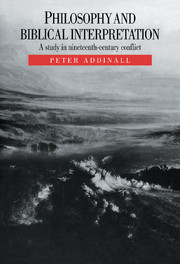Book contents
- Frontmatter
- Contents
- Preface
- Introduction
- 1 The general picture
- 2 David Hume
- 3 William Paley
- 4 Biblical conservatism
- 5 Conservative natural theology: Paley's design argument
- 6 Conservative natural theology: Thomas Chalmers
- 7 Liberal natural theology
- 8 The later nineteenth century
- 9 Immanuel Kant
- 10 Critical philosophy and the Bible
- Conclusion
- Notes
- Bibliography
- Index
10 - Critical philosophy and the Bible
Published online by Cambridge University Press: 23 December 2009
- Frontmatter
- Contents
- Preface
- Introduction
- 1 The general picture
- 2 David Hume
- 3 William Paley
- 4 Biblical conservatism
- 5 Conservative natural theology: Paley's design argument
- 6 Conservative natural theology: Thomas Chalmers
- 7 Liberal natural theology
- 8 The later nineteenth century
- 9 Immanuel Kant
- 10 Critical philosophy and the Bible
- Conclusion
- Notes
- Bibliography
- Index
Summary
INTRODUCTION
There is no greater field of human experience than that referred to as religion, and the believer rightly feels that there is a great deal more to religious thought than finding answers to scepticism. Worship and prayer and the attempt to put into daily practice what are conceived to be the commands of God, loyalty to centuries or millennia of tradition, participation in human fellowship and the giving and receiving of mutual comfort, all the many and greatly varied activities, feelings and ideas which we call religious seem to be quite incompatible with persistent doubt and the spending of time and trouble on questions which imply that the whole enterprise is nothing better than an elaborate charade. How can anyone worship and obey the God whose existence is a source of perennial doubt?
The beginning of an answer to this question is that belief and doubt are not so sharply or clearly divided as the question assumes. The idea that any human being can attain to a state of religious knowledge, which really is knowledge and which excludes even the possibility of doubt, is open to serious question. The spectacle provided by those who lay claim to such knowledge, often in rival and violently hostile groups, does not encourage acceptance of the idea by any reasonable and honest person.
When different religious parties lay claim to knowledge of mutually contradictory truths, the door to scepticism is not closed but thrown wide open. It was precisely the intolerance attendant upon dogmatism which evoked what was perhaps the most devastating expression of religious scepticism ever known in the English-speaking world, Hume's Dialogues Concerning Natural Religion.
- Type
- Chapter
- Information
- Philosophy and Biblical InterpretationA Study in Nineteenth-Century Conflict, pp. 262 - 296Publisher: Cambridge University PressPrint publication year: 1991

